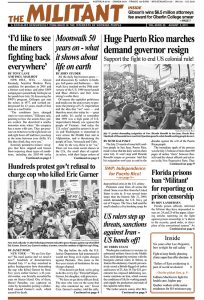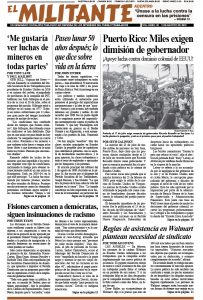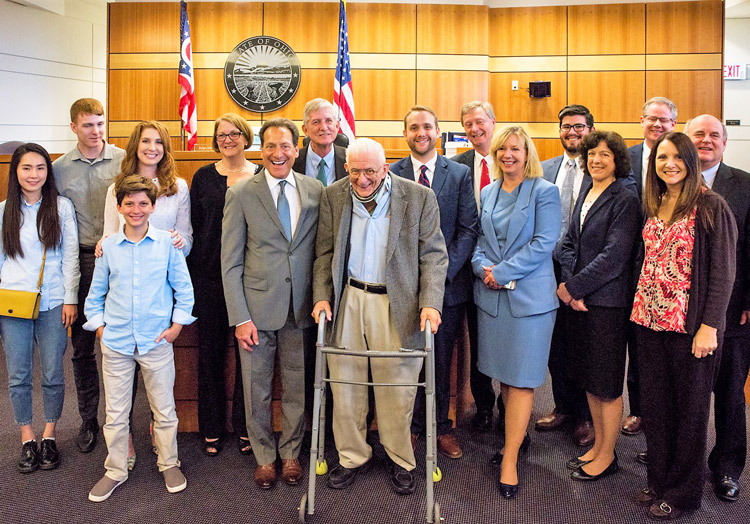On July 17, Ohio Judge John Miraldi awarded $6.5 million in legal fees to the lawyers representing Gibson’s Bakery in its suit against Oberlin College. College officials had helped organize a malicious slander campaign accusing the bakery of racism. The fees come on top of the $25 million in compensatory and punitive damages for putting the bakery and its owners through hell.
The Gibson family’s lead attorney, Lee Plakas, correctly called the college’s slander campaign “a declaration of war.” The judge’s ruling sends a message that it is possible to “withstand the power and resources” of large institutions, like Oberlin College, Plakas said after the latest ruling.
“The unanimous verdict and the awarding of legal fees is a victory for working people,” Socialist Workers Party member Peter Thierjung told a Militant Labor Forum in New York July 20. “And the size of the award for legal fees is punishment for the college’s scorched-earth policy in conducting their smear campaign against Gibson’s.”
Despite admitting to having $59 million on hand, as well as numerous other assets, the college says it will appeal, pleading poverty.
Gibson’s lawyers have asked the court to require the college to post a bond guaranteeing they will be paid if the award is delayed during an appeal. “This is the next stage in the fight to hold the college responsible for its assault against the small bakery,” Thierjung said.
Oberlin College tried to financially drain the Gibsons and force them to give up by dragging out the trial with all manner of legal maneuvers, he said. They conducted 32 depositions, including with every member of the Oberlin town police force. They deposed 90-year-old Allyn Gibson Sr. for five days of grilling.
The judge said in his ruling the legal battle “presented extraordinary challenges for the plaintiffs.”
In response to the slanders by college administrators, Thierjung said, the Gibsons’ lawyers issued a 56-page “FAQ,” which devastatingly answered them with quotes from trial testimony and depositions. Copies are available at: http://www.kwgd.com/uploads/faqs-re-gibson-s-bakery-v.pdf
What happened at Gibson’s
Thierjung walked through the facts of the case. How three Oberlin College students who are Black, a man and two women, used a fake ID to try to buy a bottle of wine in November 2016. The ID was rejected and Allyn Gibson Jr. confronted the young man about two bottles of wine hidden under his shirt. Gibson followed him out. When cops arrived they found Gibson on the ground being beaten by the three.
The three later pled guilty to misdemeanor charges, paid restitution, and each made a statement that “the employees of Gibson’s actions were not racially motivated. They were merely trying to prevent an underage sale.”
Nonetheless, for the next two days hundreds of students, organized, encouraged and accompanied by Meredith Raimondo, dean of students and college vice president, and other college officials protested outside Gibson’s denouncing the arrests, claiming it had a long history of racial profiling and calling for a boycott of the small business.
Students were given permission to use college copiers to print flyers accusing the store of racism, gave students refreshments and pizza, and even cancelled classes and gave students credit to participate in the actions. Raimondo spoke at the protest, helping to orchestrate it. Later on the college terminated Gibson’s contract to provide baked goods to the dining service on Raimondo’s instructions.
University-authorized guides, giving tours of the campus to prospective students and their families, encouraged them to boycott the bakery.
Workers in solidarity with Gibsons
Working people in the area were repulsed by the slander campaign, Thierjung said. To the surprise of college officials, people came from all over the region to shop at Gibson’s in a show of solidarity.
“At the heart of the issues in the case are questions of class and class privilege,” Thierjung said.
He pointed out that like most students at Oberlin, the shoplifters were not “wanting” economically. The young man graduated in 2015 from Phillips Academy in Andover, Massachusetts, a boarding school with a billion dollar endowment, which is larger than Oberlin’s, and tuition of $58,000 a year. Oberlin itself is one of the top 20 most expensive colleges in the U.S.
The 2,800 students at Oberlin are mostly upper-middle-class, Thierjung said, being groomed for a career in academia, the government bureaucracy, nonprofits, think tanks, etc., as part of the privileged meritocratic layers that help defend capitalist rule.
Oberlin is a company town, where “the college dictates to small businesses what they will pay, how much, when,” Thierjung said. And its officials look at the small businesses and “townies” with scorn.
A year after the boycott started, The Grape, a student newspaper, ran an article titled “The Culture of Theft.” Editor-in-Chief Jake Berstein, no friend of the Gibson’s, interviewed fellow students and wrote, “We uncovered a sad truth: That the majority of shoplifting in Oberlin is carried out by students.” Most of the students could easily pay for what they stole, he admitted. Why shoplift? Berstein said a common answer was “I felt like it.” He said he had shoplifted at Gibson’s.
The financial consequences for the small businesses — struggling in the face of stiff competition from big box stores like Walmart — is substantial. One Oberlin store estimated an annual loss of over $10,000.
The Gibsons tried to get the university administration to change course and issue a statement saying that the bakery and its owners are not racists and don’t engage in racial profiling. The college refused.
College administrators demanded that Gibson’s agree to call the college, not the cops, when it catches a student shoplifting, a privilege other town residents wouldn’t have. If Gibson’s would go along, the college would stop boycotting the store.
When the Gibsons said no, Vice President for Communications Ben Jones wrote, “All these idiots complaining about the college hurting a ‘small local business.’ …
“F— ‘em.”
Oberlin’s slanders continue
Despite the conclusion of the court case — with Judge Miraldi writing “case closed” at the end of his last ruling — college officials have launched a countercampaign, falsely claiming the jury’s verdict as an attack on students’ free speech. College President Carmen Twillie Ambar has traveled the country seeking coverage in the New York Times, Wall Street Journal and other media making this claim.
But the Gibsons and their attorneys never sued any student or questioned anyone’s right to protest. Instead, they sued the college and its administrators for their actions slandering the family and deliberately harming their business.
The Gibsons’ lawyers put Raimondo on the stand as a hostile witness. She was asked about an email she wrote after college professor Roger Copeland emailed administrators urging them to stop their slander campaign.
In the email Raimondo said “F— him. I’d say unleash the students if I wasn’t convinced this needs to be put behind us.”


